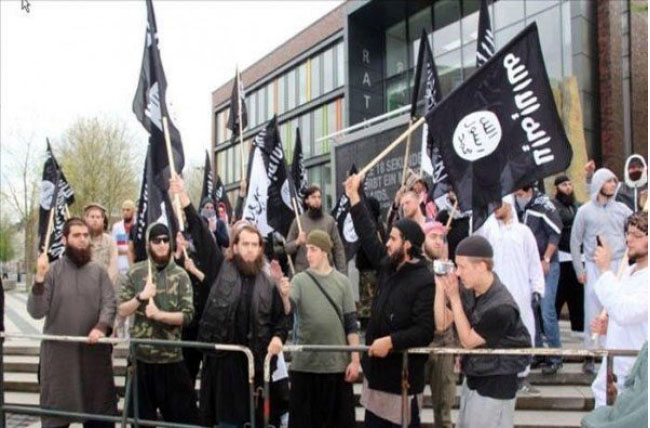According to reports, the US formally designated the Islamic State of Iraq and the Levant (ISIL) group’s affiliate in Afghanistan and Pakistan as a terrorist organization. The US State Department has said the order concerned the Islamic State group’s “Khorasan Province” — which US officials refer to as “ISIL-K.” It said, “The group is based in the Afghanistan-Pakistan region and is composed primarily of former members of Tehrik-e Taliban Pakistan and the Afghan Taliban.” Based on the statement, the group pledged loyalty to the head of the Islamic State’s self-proclaimed “caliphate”, Abu Bakr al-Baghdadi, in January 2015. “ISIL-K has carried out suicide bombings, small arms attacks and kidnappings in eastern Afghanistan against civilians and Afghan National Security and Defense Forces, and claimed responsibility for May 2015 attacks on civilians in Karachi, Pakistan.” The group also recently carried out terrorist attacks at Pakistani diplomatic missions in Afghanistan.
“The US Department of State has announced the designation of ISIL-K as a Foreign Terrorist Organization (FTO) under Section 219 of the Immigration and Nationality Act,” which authorizes the administration to make such designations, says a statement issued in Washington.
It is said that this year, the group recruited scores of fighters from the militants who fled to Afghanistan after Pakistan launched a military operation in Pakistan’s Federally Administrative Tribal Area (FATA). Among the Afghan Taliban fighters, the group targets those who are disgruntled with the current Taliban leadership.
It comes as the President Muhammad Ashraf Ghani ordered the Ministry of Defense (MoD) last week to keep bombing the ISIL militant group saying that it has no room in our territory.
Not surprisingly, members of the Taliban insurgents pledged allegiance to the ISIL group with its emergence in Afghanistan. Currently, this group has changed into a political crisis and gained firm foothold in restive parts of the country, mainly in Nangarhar province. This militant group has ushered in insurgency and put its radical ideology into practice through stoking sectarian violence, beheading the civilians, terrorizing the locals, etc. It was said earlier that the ISIL militants seek to establish a connection with the Iraq’s central leadership – this will multiply insecurity and civilian casualties.
Following the fall of Taliban’s regime in 2001, a sense of hope was in the air for establishing a democratic government. Afghan nation breathed a sigh of relief and girls’ schools were reopened. Women were released from restrictions and initiated to play their social, political, cultural and economic role in the society. Among the list of presidential candidates, women’s names were also seen there. Similarly, a considerable number of women were nominated in parliamentary and provincial council elections. Afghan men and women flocked to ballot-boxes as their eyes sparkled with hope and excitement. They believed that their ballots would root out violence and bloodshed and their rights to life, liberty and property would be protected under a democratic government. They dreamt a utopian society – where one’s dignity and freedom would be respected to a great extent.
Moreover, the Afghanistan constitution also declared the state’s responsibility as, “Form a civil society void of oppression, atrocity, discrimination as well as violence, based on rule of law, social justice, protecting integrity and human rights, and attaining peoples’ freedoms and fundamental rights; strengthen political, social, economic as well as defense institutions; attain a prosperous life and sound living environment for all inhabitants of this land; and, eventually, regain Afghanistan’s appropriate place in the international family”.
However, the public dream did not come true and the insurgency resurfaced. The Taliban’s ragtag militants were reorganized and staged terrorist attacks and suicide bombings across the country. Some of the voters’ fingers, which were inked for voting in election, were cut by the Taliban militants – it indicated the futility of immature democracy. In other words, the Afghan’s nascent democracy is unlikely to be a panacea for the bleeding wounds of the nation and failed to assuage the public sufferings. The civilians’ blood was spilled, their freedom was curtailed and their rights and dignity were violated in one way or another. The militants also sprayed corrosive acid on the face of some school girls in Kandahar and razed some of girls’ schools to the ground. Hence, they were terrorized and discriminated against on the grounds of their sex by the misogynist Taliban.
To alleviate the political crisis and end militancy, the Hamid Karzai’s government sought to bring the Taliban – under the term of “discontented brothers” – to the negotiating table and established a High Peace Council (HPC) in 2010. On the other hand, the US-led NATO forces countered insurgency under the mission of “war on terror”. In short, both conciliatory and military ways were exerted to bring in peace. However, none of them have come to fruition yet. The NATO combat mission was over and the bulk of its troops withdrew from the country. Now, the National Unity Government (NUG) seeks to resume peace talk, which will be brokered by Pakistan, US and China. Currently, the ISIL-K is a major problem ahead of the NUG and has changed into a political crisis. Besides being involved in militancy, ISIL intends to extend its realm of influence through employing the naïve individuals under religious magnetism. This militant group has to be combated strongly before incubating and finding safe havens in the country.

